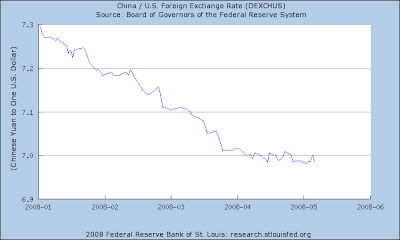Gary Becker: The rise of price of oil
Yes, I am all hooked up with recent run-up of oil price.
Here is another piece from Gary Becker, one of my most admired economists. He thinks the predictions such as the one made by Goldman Sachs analyst, $200 per barrel crude in the near future “are not based on much analysis, and mainly just extrapolate this sharp upward trend in oil prices into the future.”
Something to take away from his insightful analysis:
For the evidence is rather strong that the short run response of both the supply of and the demand for oil to price increases is rather small. The small elasticity of both the supply and demand for oil explains why the moderate reductions in world oil supply during the earlier price spikes, and the moderate increase in world demand during the current price boom, produced such large increases in price.
Frankel rebuffs White House’ call on slowdown not recession
It is true that the Commerce Department BEA’s advanced estimate of first-quarter GDP growth was still above zero (+0.6%). But there are three reasons not to take this number too seriously.
(1) Revisions in these numbers are usually substantial, so the final number could easily turn out to be negative — or twice as high. (my comment: revision is esp. high around turning point)
(2) Even if the +0.6% number were to hold up, it can be entirely accounted for by measured inventory investment. In other words, real final demand fell rather than rose in the first quarter. It is plain that this inventory accumulation was not the outcome of deliberate decisions by bullish firms to add to their inventories in anticipation of a booming economy. Rather it was almost certainly unintended inventory accumulation, as goods sat unsold on store shelves and in warehouses. This overhang makes it more likely that inventory accumulation will be negative in the 2nd quarter. (Admittedly, rising exports from the weak dollar and rising consumption from the tax rebate checks could outweigh that particular factor, and we could scrape along the ground for another quarter at near-zero growth).
(3) As Martin Feldstein has been pointing out, it is a misinterpretation of the GDP statistics to say that growth remained positive in the first quarter. Rather GDP for QI as a whole was estimated to have been 0.6% higher as compared to QIV as a whole. The Commerce Department does not report monthly GDP estimates, but MacroAdvisers does, and these data suggest that monthly GDP has been declining since January.
Difficult time for American banks
Since I read this book about Citibank, I have always kept a close eye on the firm and banking industry in general. The restructuring plan announced by their new CEO last week received little enthusiasm by the star bank analyst Meredith Whitney. Watch this Bloomberg video and help you understand the outlook of the financials.
What lowest NYSE volume implies
A nice piece from Barry Ritholtz on today’s YTD lowest NYSE volume. Lowest volume rally is a bear market rally and implies short coverage.
Alternative to buying up foreign land
China, where self-sufficiency in food is coming under pressure as a richer population consumes more meat, is considering whether to make support for offshore land acquisition, in places such as Africa and South America, an official government policy. A private-equity group in the United Arab Emirates is buying land in Pakistan with government support, while other resource-rich but food-poor nations – oil producers such as Saudi Arabia and Libya – are looking abroad to secure their food supplies.Foreign investment in agricultural land should not be a problem. One recent estimate is that 15 per cent of all purchases of UK agricultural land are made by foreign investors. Even more than a power station or a yoghurt producer – which have caused rows about foreign investment in recent years – farmland is a fixed asset. Foreign investors bring capital, expertise and markets; they are a good thing.
China inflation up 8.5% in April
Krugman, oil nonbubble
Paul Krugman today argues in NY Times that we don’t have oil bubble. His usual argument is that if this was speculation, there should be an inventory buildup. I think he’s wrong and his argument is inconsistent.
First, oil demand, just like food, can be very inelastic, i.e., demand will not fall much even with rising oil price. For the same reason, with a small decrease of supply, even without much increase of demand, price can rise sharply.
Second, Krugman himself admits due to driving habit, infrastructure layout, and policies, it’s very hard for people to adjust their behavior within a short period of time.
I tend to think the current runup of oil price is mainly due to falling dollar, supply constraint, and most importantly, speculation. What differs from previous times is the availability of a lot of new financial instruments for both institutional and individual investors to speculate on oil and other commodities. Yes, I have ETF in mind.


